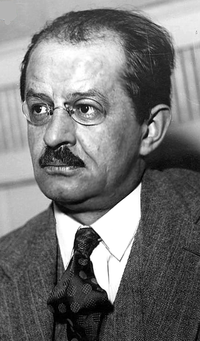Leon Kozłowski
| Leon Kozłowski | |
|---|---|

Leon Kozłowski
|
|
|
Prime Minister of the Republic of Poland 24th Prime Minister of the Second Republic |
|
|
In office 15 May 1934 – 28 March 1935 |
|
| President | Ignacy Mościcki |
| Preceded by | Janusz Jędrzejewicz |
| Succeeded by | Walery Sławek |
| Personal details | |
| Born |
Leon Tadeusz Kozłowski 6 June 1892 Rembieszyce, Congress Poland |
| Died | 11 May 1944 (aged 51) Berlin, German Reich |
| Resting place | Powązki Cemetery |
| Nationality | Polish |
| Political party | Non-partisan Bloc for Cooperation with the Government |
| Profession | Archaeologist |
Leon Tadeusz Kozłowski (Polish pronunciation: [ˈlɛɔn kɔˈzwɔfskʲi]; 6 June 1892 – 11 May 1944) was a Polish archaeologist and politician who served as Prime Minister of Poland from 1934 to 1935, before being convicted and sentenced to death for Treason during World War II.
Leon Kozłowski was born in 1892 in the village of Rembieszyce near Małogoszcz. Prior to 1914 he moved with his family to Lwów in Galicia, where he joined the local university. He also joined the Riflemen Union and Association of Progressive Youth. After the outbreak of the Great War he joined Józef Piłsudski's Polish Legions, where he served in the 1st Uhlans Regiment. After the Oath Crisis of 1917 he joined the Polish Military Organization and organized the cadres of the future Polish Army.
When Poland regained her independence in 1918, Kozłowski volunteered for the Polish Army and served with distinction during the Polish-Bolshevik War. Afterwards he was demobilized and returned to Lwów, where he completed his studies at the University of Jan Kazimierz. In 1921 he became a professor there and the head of the Faculty of Pre-history. He held that post between 1921 and 1931 and then again between 1935 and 1939. He was also active in various social and political organizations, including the Society for the Repair of the Republic. As such, following a military coup in 1928 he got involved in the BBWR movement and the same year he was elected to the Sejm. He held the post of a Member of Parliament until 1935, when he was chosen to the Senate of Poland.
...
Wikipedia
